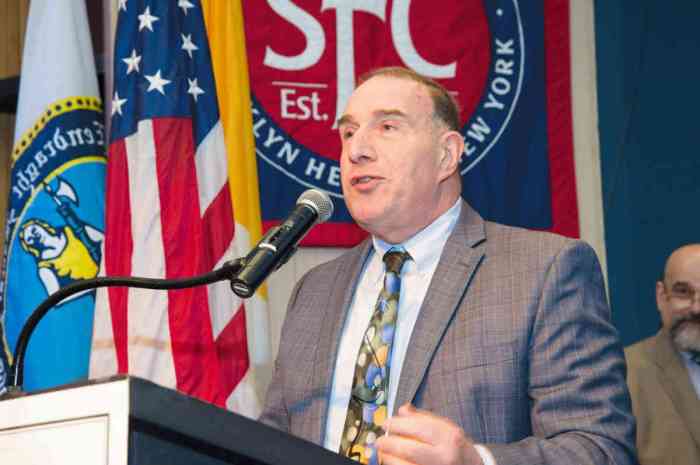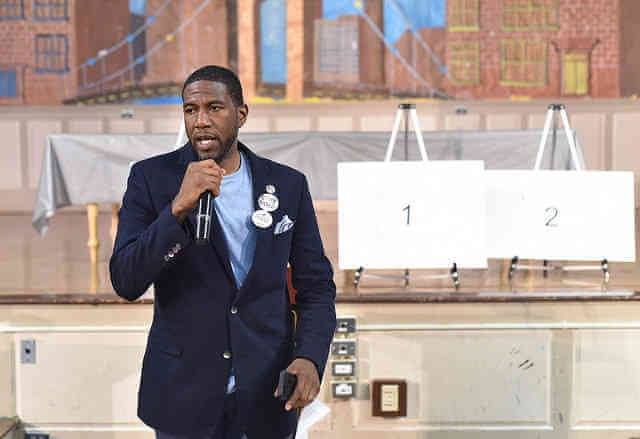Randi Weingarten, the out lesbian president of the American Federation of Teachers, is critical of the Human Rights Campaign for its refusal to sign a letter in support of African-American workers in Mississippi trying to organize at a Nissan plant. | DONNA ACETO
Labor leaders and progressive activists are taking the Human Rights Campaign (HRC) to task for being one of two major civil rights organizations to refuse to support African-American workers in Mississippi trying to organize at a Nissan plant.
Seventeen members of the Leadership Conference on Civil and Human Rights were asked to sign on to a letter to Nissan North America citing the National Labor Relations Board’s finding that Nissan has “threatened its employees with termination because of their union activities” and accusing the automaker of opposing “civil rights at the Canton plant and of this majority African-American workforce. We urge you to accord these workers the same dignity and respect that Nissan workers are provided everywhere else in the world.”
Only the Human Rights Campaign and the National Urban League declined to sign on to the letter that was signed by the NAACP, the National Organization for Women, Unidos USA, the National Council of Churches, and Asian Americans Advancing Justice, among others.
Fellow members of Leadership Conference on Civil and Human Rights call out leading LGBTQ lobby
Lee A. Saunders, president of the American Federation of State, County and Municipal Employees (AFSCME) and treasurer of the Leadership Conference, told Gay City that HRC’s snub was “disconcerting.”
“We’re not asking people to walk a picket line,” Saunders said, “just sign off on a letter that said the workers should be the given the opportunity to make the decision of whether they wanted to be a part of the UAW without coercion threats.”
Saunders added, “These are predominately African-American workers fighting every single day to get by, precisely the people that HRC should be working with — minority communities across the country. It would have been a show of solidarity with communities of color. But they thought their relationship with Nissan was more important. I expressed the disappointment of the 1.6 million members of AFSCME. Their comment was that they have a good relationship with Nissan and that Nissan has a strong record on LGBT issues. But you not only have to talk the talk, you have to walk the walk.”
Randi Weingarten, the out lesbian leader of the American Federation of Teachers, said, “It’s deeply disappointing that HRC would not stand for the workers’ rights and affirm that human rights and civil rights are synonymous with workers’ rights, particularly at a time when there is an assault on those we represent. We need to stand to together on behalf of all of us. Unions like my own and so many other labor unions have been soldiers in the fights for LGBTQ priorities for decades. And when it comes to LGBTQ issues, we don’t shy away from championing them regardless of what other feathers it might ruffle. I weighed in strongly with Mary Beth Maxwell of HRC [who served in the Obama administration as the principal deputy assistant secretary for policy at the Department of Labor]… who refused to acknowledge the seriousness of this situation.”
All this criticism and more was conveyed to the Human Rights Campaign and its response was a statement on which the group would not elaborate. Chris Sgro, communications director, said, “We strongly believe workers have a right to unionize and organize. This is something HRC has affirmed strongly in filings with the Supreme Court and we support the Employee Free Choice Act. We are proud to stand with workers and will continue to do.”
The Urban League did not return a call for comment.
Jerame Davis, longtime executive director of Pride at Work at the AFL-CIO, said, “We’ve been documenting HRC’s less than friendly labor policies for a while. HRC gets most of their money from corporations, and they don’t want to bite the hand that feeds them. This wasn’t a big ask. This was almost pro forma — to voluntarily recognize the union after a vote and not to fight it.”
Davis criticized HRC’s Corporate Equality Index, which purports to document how pro-LGBTQ a company is.
“We’ve tried to highlight it is not what they present it as,” Davis said, saying of some companies who garner high ratings that their attitude is: “‘We treat our workers like shit across the board, whether they’re LGBT or not.’ It just measures whether or not they have certain policies in place.” Davis said the index “doesn’t look at how the policies are implemented or whether they are implemented or at union-busting activity or active lawsuits” against the company as there were against Walmart when HRC rated it highly.
Davis emphasized, “You can still be fired in 28 states for being LGBT. Union-busting is an LGBT issues because the union contract [with a clause banning anti-LGBTQ discrimination] is the only thing that can protect LGBT workers” in many places.
Allen Roskoff, president of the Jim Owles Liberal Democratic Club, which has a close, reciprocal working relationship with labor in New York, said, “HRC has never been in the forefront of the civil rights movement. When other civil rights movements embraced the LGBT rights agenda, HRC acted as if they have it coming but they are not there for other civil rights organizations.”
This snub of an African-American cause reminded Roskoff that when Chuck Schumer ran against Al D’Amato for US Senate in 1998, “HRC supported Al D’Amato, who said in 1991 that David Dinkins should ‘go back to Africa and stay there’ and referred to people in the housing projects as ‘animals.’”
Roskoff said, “We’re not supporting the constitutional convention in New York on the ballot this fall because our friends in labor think it can roll back the rights of workers. We are not going to second- guess progressive labor.”
Kenneth Sherrill, an out gay professor emeritus of political science at Hunter College, said, “I should never be shocked by things HRC does or doesn’t do. My sense is they’ve invested an awful lot of time in building relationships with labor and industry. Have we really reached the point where they are more afraid of offending industry than they are labor? This is one of those issues where not signing isn’t staying neutral.”
[Editor's note: In the original posting of this story, the AFSCME membership was incorrectly stated as 1.1 million. It should have read 1.6 million.]


































